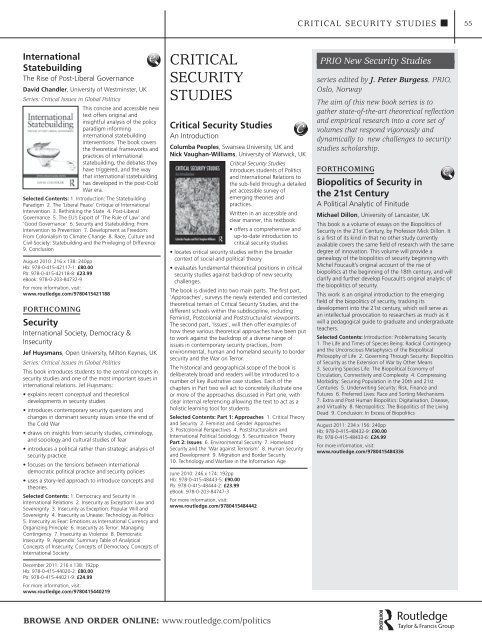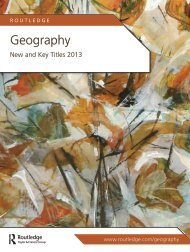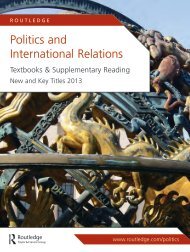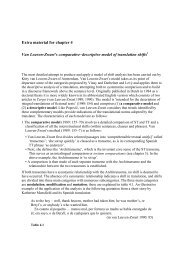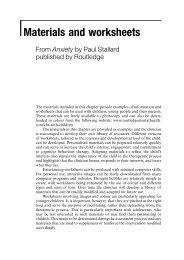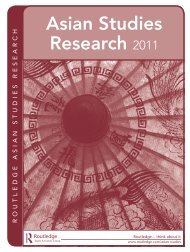Politics and International Relations 2011 (UK) - Routledge
Politics and International Relations 2011 (UK) - Routledge
Politics and International Relations 2011 (UK) - Routledge
Create successful ePaper yourself
Turn your PDF publications into a flip-book with our unique Google optimized e-Paper software.
<strong>International</strong><br />
Statebuilding<br />
The Rise of Post-Liberal Governance<br />
david Ch<strong>and</strong>ler, University of Westminster, <strong>UK</strong><br />
Series: Critical Issues in Global <strong>Politics</strong><br />
This concise <strong>and</strong> accessible new<br />
text offers original <strong>and</strong><br />
insightful analysis of the policy<br />
paradigm informing<br />
international statebuilding<br />
interventions. The book covers<br />
the theoretical frameworks <strong>and</strong><br />
practices of international<br />
statebuilding, the debates they<br />
have triggered, <strong>and</strong> the way<br />
that international statebuilding<br />
has developed in the post-Cold<br />
War era.<br />
Selected Contents: 1. Introduction: The Statebuilding<br />
Paradigm 2. The ‘Liberal Peace’ Critique of <strong>International</strong><br />
Intervention 3. Rethinking the State 4. Post-Liberal<br />
Governance 5. The EU’s Export of ‘The Rule of Law’ <strong>and</strong><br />
‘Good Governance’ 6. Security <strong>and</strong> Statebuilding: From<br />
Intervention to Prevention 7. Development as Freedom:<br />
From Colonialism to Climate Change 8. Race, Culture <strong>and</strong><br />
Civil Society: Statebuilding <strong>and</strong> the Privileging of Difference<br />
9. Conclusion<br />
August 2010: 216 x 138: 240pp<br />
Hb: 978-0-415-42117-1: £80.00<br />
Pb: 978-0-415-42118-8: £23.99<br />
eBook: 978-0-203-84732-9<br />
For more information, visit:<br />
www.routledge.com/9780415421188<br />
ForthcomiNg<br />
Security<br />
<strong>International</strong> Society, Democracy &<br />
Insecurity<br />
Jef Huysmans, Open University, Milton Keynes, <strong>UK</strong><br />
Series: Critical Issues in Global <strong>Politics</strong><br />
This book introduces students to the central concepts in<br />
security studies <strong>and</strong> one of the most important issues in<br />
international relations. Jef Huysmans:<br />
• explains recent conceptual <strong>and</strong> theoretical<br />
developments in security studies<br />
• introduces contemporary security questions <strong>and</strong><br />
changes in dominant security issues since the end of<br />
the Cold War<br />
• draws on insights from security studies, criminology,<br />
<strong>and</strong> sociology <strong>and</strong> cultural studies of fear<br />
• introduces a political rather than strategic analysis of<br />
security practice<br />
• focuses on the tensions between international<br />
democratic political practice <strong>and</strong> security policies<br />
• uses a story-led approach to introduce concepts <strong>and</strong><br />
theories.<br />
Selected Contents: 1. Democracy <strong>and</strong> Security in<br />
<strong>International</strong> <strong>Relations</strong> 2. Insecurity as Exception: Law <strong>and</strong><br />
Sovereignty 3. Insecurity as Exception: Popular Will <strong>and</strong><br />
Sovereignty 4. Insecurity as Unease: Technology as <strong>Politics</strong><br />
5. Insecurity as Fear: Emotions as <strong>International</strong> Currency <strong>and</strong><br />
Organizing Principle 6. Insecurity as Terror: Managing<br />
Contingency 7. Insecurity as Violence 8. Democratic<br />
Insecurity 9. Appendix: Summary Table of Analytical<br />
Concepts of Insecurity, Concepts of Democracy, Concepts of<br />
<strong>International</strong> Society<br />
December <strong>2011</strong>: 216 x 138: 192pp<br />
Hb: 978-0-415-44020-2: £80.00<br />
Pb: 978-0-415-44021-9: £24.99<br />
For more information, visit:<br />
www.routledge.com/9780415440219<br />
criticAl<br />
security<br />
studies<br />
Critical Security Studies<br />
An Introduction<br />
Columba Peoples, Swansea University, <strong>UK</strong> <strong>and</strong><br />
Nick Vaughan-Williams, University of Warwick, <strong>UK</strong><br />
Critical Security Studies<br />
introduces students of <strong>Politics</strong><br />
<strong>and</strong> <strong>International</strong> <strong>Relations</strong> to<br />
the sub-field through a detailed<br />
yet accessible survey of<br />
emerging theories <strong>and</strong><br />
practices.<br />
Written in an accessible <strong>and</strong><br />
clear manner, this textbook:<br />
• offers a comprehensive <strong>and</strong><br />
up-to-date introduction to<br />
critical security studies<br />
• locates critical security studies within the broader<br />
context of social <strong>and</strong> political theory<br />
• evaluates fundamental theoretical positions in critical<br />
security studies against backdrop of new security<br />
challenges.<br />
The book is divided into two main parts. The first part,<br />
‘Approaches’, surveys the newly extended <strong>and</strong> contested<br />
theoretical terrain of Critical Security Studies, <strong>and</strong> the<br />
different schools within the subdiscipline, including<br />
Feminist, Postcolonial <strong>and</strong> Poststructuralist viewpoints.<br />
The second part, ‘Issues’, will then offer examples of<br />
how these various theoretical approaches have been put<br />
to work against the backdrop of a diverse range of<br />
issues in contemporary security practices, from<br />
environmental, human <strong>and</strong> homel<strong>and</strong> security to border<br />
security <strong>and</strong> the War on Terror.<br />
The historical <strong>and</strong> geographical scope of the book is<br />
deliberately broad <strong>and</strong> readers will be introduced to a<br />
number of key illustrative case studies. Each of the<br />
chapters in Part two will act to concretely illustrate one<br />
or more of the approaches discussed in Part one, with<br />
clear internal referencing allowing the text to act as a<br />
holistic learning tool for students.<br />
Selected Contents: Part 1: Approaches 1. Critical Theory<br />
<strong>and</strong> Security 2. Feminist <strong>and</strong> Gender Approaches<br />
3. Postcolonial Perspectives 4. Poststructuralism <strong>and</strong><br />
<strong>International</strong> Political Sociology 5. Securitization Theory<br />
Part 2: Issues 6. Environmental Security 7. Homel<strong>and</strong><br />
Security <strong>and</strong> the ‘War against Terrorism’ 8. Human Security<br />
<strong>and</strong> Development 9. Migration <strong>and</strong> Border Security<br />
10. Technology <strong>and</strong> Warfare in the Information Age<br />
June 2010: 246 x 174: 192pp<br />
Hb: 978-0-415-48443-5: £90.00<br />
Pb: 978-0-415-48444-2: £23.99<br />
eBook: 978-0-203-84747-3<br />
For more information, visit:<br />
www.routledge.com/9780415484442<br />
Browse <strong>and</strong> order online: www.routledge.com/politics<br />
criticAl security studies<br />
PRIO New Security Studies<br />
series edited by J. Peter burgess, PRIo,<br />
oslo, Norway<br />
The aim of this new book series is to<br />
gather state-of-the-art theoretical reflection<br />
<strong>and</strong> empirical research into a core set of<br />
volumes that respond vigorously <strong>and</strong><br />
dynamically to new challenges to security<br />
studies scholarship.<br />
ForthcomiNg<br />
Biopolitics of Security in<br />
the 21st Century<br />
A Political Analytic of Finitude<br />
Michael dillon, University of Lancaster, <strong>UK</strong><br />
This book is a volume of essays on the Biopolitics of<br />
Security in the 21st Century, by Professor Mick Dillon. It<br />
is a first of its kind in that no other study currently<br />
available covers the same field of research with the same<br />
degree of innovation. This volume will provide a<br />
genealogy of the biopolitics of security beginning with<br />
Michel Foucault’s original account of the rise of<br />
biopolitics at the beginning of the 18th century, <strong>and</strong> will<br />
clarify <strong>and</strong> further develop Foucault’s original analytic of<br />
the biopolitics of security.<br />
This work is an original introduction to the emerging<br />
field of the biopolitics of security, tracking its<br />
development into the 21st century, which will serve as<br />
an intellectual provocation to researchers as much as it<br />
will a pedagogical guide to graduate <strong>and</strong> undergraduate<br />
teachers.<br />
Selected Contents: Introduction: Problematising Security<br />
1. The Life <strong>and</strong> Times of Species Being: Radical Contingency<br />
<strong>and</strong> the Unconscious Metaphysics of the Biopolitical<br />
Philosophy of Life 2. Governing Through Security: Biopolitics<br />
of Security as the Extension of War by Other Means<br />
3. Securing Species Life: The Biopolitical Economy of<br />
Circulation, Connectivity <strong>and</strong> Complexity 4. Compressing<br />
Morbidity: Securing Population in the 20th <strong>and</strong> 21st<br />
Centuries 5. Underwriting Security: Risk, Finance <strong>and</strong><br />
Futures 6. Preferred Lives: Race <strong>and</strong> Sorting Mechanisms<br />
7. Extra <strong>and</strong> Post Human Biopolitics: Digitalisation, Disease,<br />
<strong>and</strong> Virtuality 8. Necropolitics: The Biopolitics of the Living<br />
Dead 9. Conclusion: In Excess of Biopolitics<br />
August <strong>2011</strong>: 234 x 156: 240pp<br />
Hb: 978-0-415-48432-9: £90.00<br />
Pb: 978-0-415-48433-6: £24.99<br />
For more information, visit:<br />
www.routledge.com/9780415484336<br />
55


